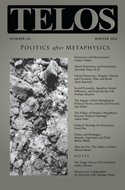Paul Rekret’s “The Impasse of Post-Metaphysical Political Theory: On Derrida and Foucault ” appears in Telos 161 (Winter 2012). Read the full version online at the Telos Online website, or purchase a print copy of the issue in our store.
 The debate between Jacques Derrida and Michel Foucault over the status of Descartes’ Meditations can be read to indicate some profound implications for the ways by which we conceive of a post-metaphysical political theory. This article documents the way in which the terms of the debate suggest that in conceiving politics after metaphysics in terms of competing accounts of the contingency of Being or, in Stephen White’s words, as weak ontologies, we are lead towards a profound paradox and impasse. To suggest that there is broad agreement in post-metaphysical political thought regarding the instability of ontology and the consequent theoretical task of questioning the grounds or foundations of particular political concepts or institutions is to overlook a fundamental paradox. What the debate between Derrida and Foucault in fact indicates is that these differing weak ontologies are in fact incommensurable with one another. Polemics among theorists at their core occur over the very ways contingency ought to be articulated, such that each account is exclusive of any other. This article will proceed by claiming that this fundamental incommensurability results in an irresolvable polemic between Derrida and Foucault, explicit in their competing accounts of Descartes’ Meditations and implicit throughout their later more explicitly political work. The incommensurability between Derrida and Foucault suggests a broader impasse that haunts any political thought affirming its own finitude and situatedness.
The debate between Jacques Derrida and Michel Foucault over the status of Descartes’ Meditations can be read to indicate some profound implications for the ways by which we conceive of a post-metaphysical political theory. This article documents the way in which the terms of the debate suggest that in conceiving politics after metaphysics in terms of competing accounts of the contingency of Being or, in Stephen White’s words, as weak ontologies, we are lead towards a profound paradox and impasse. To suggest that there is broad agreement in post-metaphysical political thought regarding the instability of ontology and the consequent theoretical task of questioning the grounds or foundations of particular political concepts or institutions is to overlook a fundamental paradox. What the debate between Derrida and Foucault in fact indicates is that these differing weak ontologies are in fact incommensurable with one another. Polemics among theorists at their core occur over the very ways contingency ought to be articulated, such that each account is exclusive of any other. This article will proceed by claiming that this fundamental incommensurability results in an irresolvable polemic between Derrida and Foucault, explicit in their competing accounts of Descartes’ Meditations and implicit throughout their later more explicitly political work. The incommensurability between Derrida and Foucault suggests a broader impasse that haunts any political thought affirming its own finitude and situatedness.



